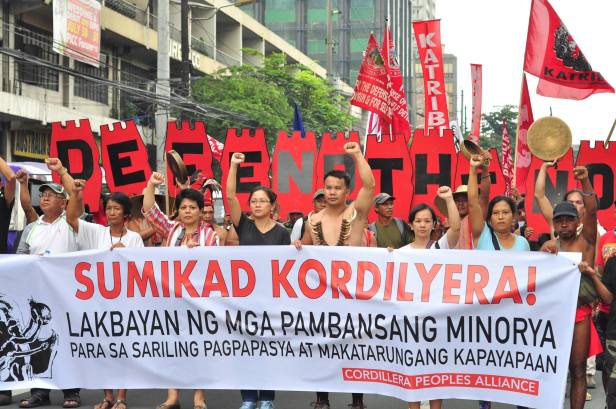
QUEZON CITY–On October 13, more than 3,000 national minorities that include indigenous peoples and Moro from Luzon, Vizayas and Mindanao gathered at Morayta in Manila City and marched to Mendiola as part of their national caravan for self-determination and just peace.
In their indigenous attires and lit torches they marched to Mendiola, at the gates of the nation’s seat of power where they reiterated their demands for the pull out of government troops from their villages, closure of destructive development projects and a stop to the violation of their rights.
Along the way, students from the Ramon Magsaysay High School and San Sebastian College-Recolletos went out of their schools to meet the national minorities on the road carrying placards signifying their support to the IP struggles.
Unity
At Mendiola, the national minorities staged a program that opened with a unity dance of the Cordillera IPs. The unity dance featured strips of cloth with different colors tied to a bamboo pole and were woven through the dance.
Julius Caesar Daguitan of the Asia Pacific Indigenous Youth Network (APIYN) explained that the strips of cloth with different colors represent the diversity of national minorities and the weaving together represents the forging of unity among national minorities.
“Through the dance we wanted to how that like threads when woven into one colorful tapestry they become more beautiful and stronger,” Daguitan said.
Daguitan said that amid the differences and diverse cultures and traditions, IPs and Moros are bound by one struggle, in the struggle to defend their ancestral lands and assert their light to self-determination.
Participants to the said gathering include Tumandok, Aggay, Dumagat, Mangyan, Igorot, Lumad, Moro, Tagbanua, Palaw-an and Aeta.
Development aggression
The various national minorities presented similar struggles against displacement from their ancestral land and plunder of the natural resources within by foreign business corporation with the aid of government policies and agencies.
They also presented similar cases of human rights violations perpetrated against them as government troops are sent to their communities to secure agro-business, energy and mining projects that are taking over their territories.
The Dumagats of Southern Tagalog are protesting the Laiban dam; the Tumanduks of Panay island in Visayas against the Jalaur dam and the Igorots of Ifugao in the Cordillera region against the Alimit hydro power project of SN Aboitiz.
The Dumagats also raised that eco-tourism development also threaten their territories.
All the delegates raised cases of human rights violations perpetrated by government troops deployed to their villages.
National Oppression
Windel Bolinget, an Igorot and national chair of Katribu, a national alliance of indigenous peoples said national minorities have suffered from national oppression.
Bolinget said the answer to national oppression is the respect to the IPs collective rights to practice their socio-political systems and to freely determine their economic development.
“The state should recognize our right to practice our political systems and to determine our development path and pursue it at our own pace,” Bolinget said.
Bolinget further said the support of the wider Filipino masses is essential to the realization of the national minorities’ aspirations.
“But we must not forget that the national minorities’ struggle for the recognition of their right to self-determination should be within the framework of the national democratic movement,” he stressed.
Bolinget said that the rights of national minorities to their ancestral land and self-determination will only be fully respected when the basic problems that besets the Filipino nation are addressed.
The march to Mendiola is just the beginning of a series of activities outlined for the caravan dubbed as Pambansang Lakbayan ng Pambansang Minorya para sa Sariling Pagpapasya at Makatarungang Kapayapaan from October 13 to October 22.
After the Mendiola program, the national minorities went to the University of the Philippines Diliman. The University opened its gates and housed the national minorities for the whole duration of their protest caravan.***
For reference:
Windel Bolinget
Chairperson
